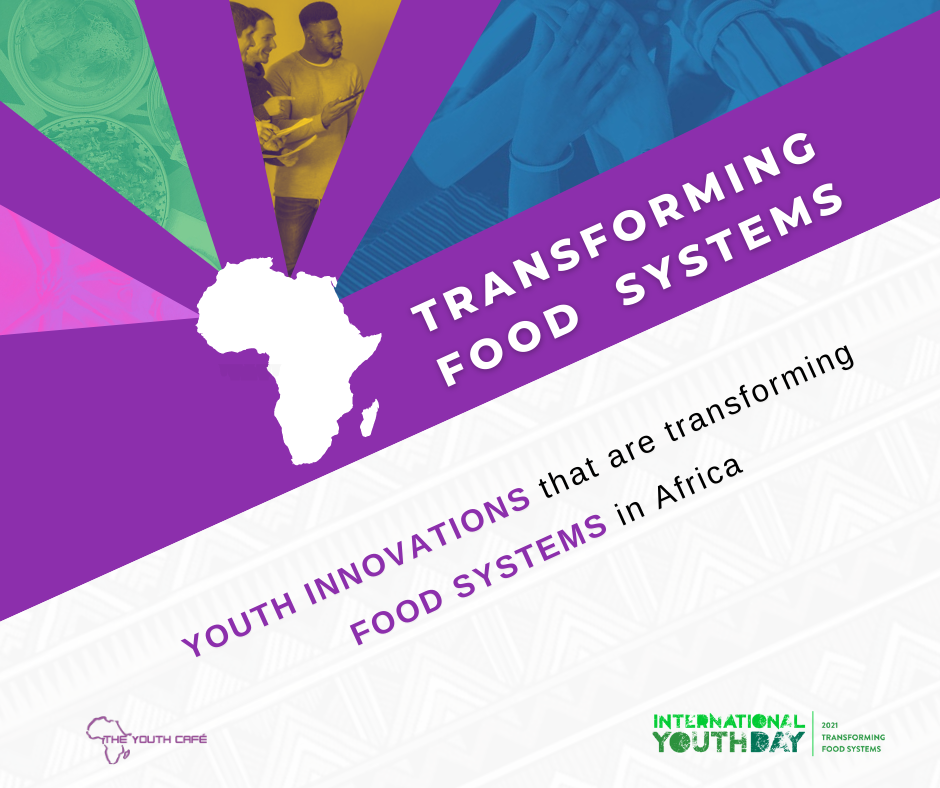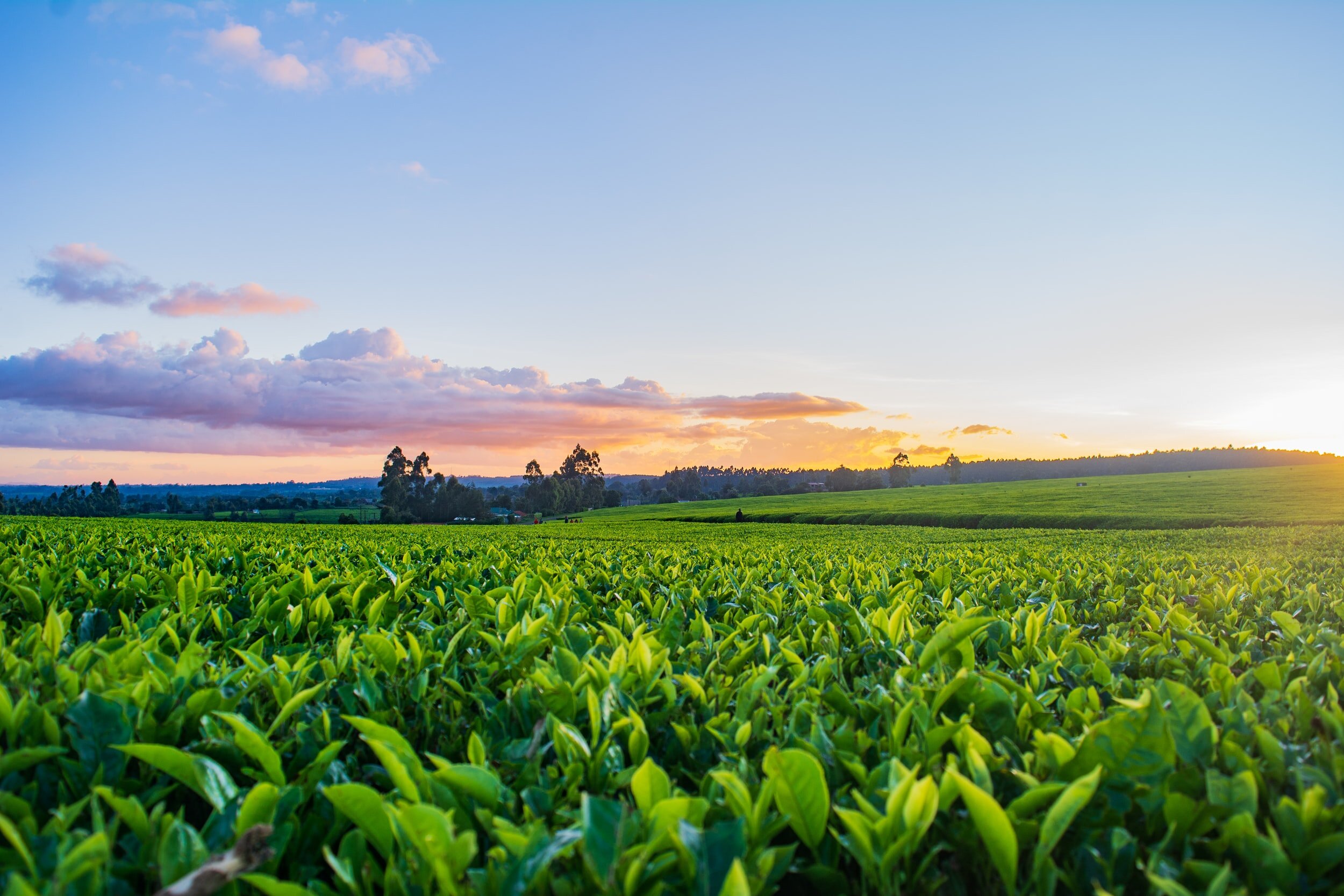Youth Innovations That Are Transforming Food Systems In Africa
International Youth Day 2021
The International Youth Day is an annual social impact awareness day to celebrate the energy and possibility represented by the youth and amplify their voices, abilities and innovations. The purpose of this day is to draw attention to the social, cultural, economic and political issues surrounding the youth. Observed on 12 August each year, 2021’s theme is “Transforming Food Systems: Youth Innovation for Human and Planetary Health”.
With the population of the world steadily increasing and humans heavily relying on the planet's resources for food, it has become evident that the support of youth in restoring and protecting the planet's biodiversity in order to transform food systems around the world is of vital importance. The young generation of today are the stakeholders of tomorrow and their input is important in bringing solutions that will lead to adequate capacity development for the creation of sustainable food systems.
According to the 2017 World Food Prize laureate, Dr. Akinwumi Adesina, the “future of African youth lies in agriculture.” This future can be realized through making agriculture both profitable and "cool" for young people. Dr. Adesina also argued for the need to move the perception of agriculture from a way of life for millions of rural people to a business.
As a youth-led and youth-serving organization pushing for youth inclusion in important decision-making processes, The Youth Café seeks to build a world on the collective principles of solidarity, justice, equity, universality, inclusion, human rights, diversity, and the integrity of the planet. Therefore, empowering African youth to be innovators and change makers for sustainable food system transformation will help lead to improved employment and economic opportunities as well as reduce inequalities and create more successful transitions for African youth in the labor market.
The Youth Café calls for an understanding of the specific impacts ineffective food systems have on young people, the recognition of young people’s own actions, their potential to advance food security, and the start of effective partnerships between organisations and the youth in order to enhance connections and raise awareness of young people's needs when it comes to food systems.
Youth Food Systems Innovations and Initiatives
Every day, millions of Africans go hungry, making Africa the world's most food-insecure region. Women and children are especially vulnerable. Grain yields are still significantly lower than the global average. Africa's food and nutrition insecurity and the prevalence of extreme poverty, are caused by low productivity, ineffective policies, and persistent underinvestment. However, Africa also has the potential to become a global agricultural powerhouse. It holds a large portion of the world's remaining undeveloped arable land.
The Youth Café looks forward to commemorate The International Youth Day especially because this years theme “Transforming Food Systems: Youth Innovation for Human and Planetary Health” coincides with one of our key thematic areas outlined in our Theory of Change, ‘Environmental Preservation and Climate Change’, where the focus is on increasing climate change literacy programs, advocacy for the creation of more green jobs, and creation of a collaborative platform where young people can actively engage and participate in finding solutions to the environmental challenges such as increased investment in the blue economy.
The Youth Cafés objectives for the environment is to contribute to the Great Green Wall Initiative and bolster efforts against desertification mapping existing agroforestry initiatives, building the capacity of women & young farmers, and initiating incentives with mobile payments for ecosystem services and ensure that women and youth are empowered to show environmental leadership in their communities.
On 5th August 2021, representatives from The Youth Café attended the UNFSS Independent Dialogue: “African Youth As Drivers For Decent Job Creation In Sustainable Food Systems'', an event organized by the Thematic Working Group on Rural Youth Employment (TWG RYE). The Youth Café also participated in FAO and AUC Virtual Technical Validation Workshop, whose theme was “Investment Guidelines For Youth In Agri-Food Systems In Africa”. The Food and Agriculture Organization (FAO) maintains that growth in the agricultural sector is at least twice as effective as growth in other areas in decreasing poverty. It has the potential to enhance youth creativity, energy, innovation, and entrepreneurship, resulting in more decent jobs and riches in the agri-food sector.
Ahead of the UN Food Systems Summit 2021, a significant number of youth in Africa have laid hold of the window to design their own future by pushing forward for transforming food systems in the continent. India will be hosting the summit which is set to take place in September 2021, with the agenda of increasing awareness of the chief role future food systems will assume in tackling climate change, malnutrition, and poverty. Without a doubt, the future of our next generation is to great extent contingent on operational food systems, and young people have the power to work towards the change needed.
Various initiatives such as the Byte by Byte Policy Innovation have been made to transform food systems in Africa with digital technologies. Under the policy, seven African nations including Morocco, Kenya, Côte d'Ivoire, Rwanda, Ghana, Nigeria and Senegal are at the frontline of progress on digitalizing the agriculture sector. Byte by Byte examines the role of policy and institutional innovations, including private sector actions that enhance farmer’s access to markets, information and services utilizing digital tools. Various examples illuminate which strategies work and which do not.
The case study analysis encompassing the seven countries provides recommendations for both private and public sector innovations to stimulate digitalization for competitiveness and development in the continent’s agricultural value chain. Nonetheless, youth have not been left behind as they have been on the forefront in transforming food systems.
One Esdras Azanmassou aged 28, has been highlighted as a young agricultural entrepreneur in Benin. The young man has dedicated 26 hectares of his land to grow varieties of purple and yellow corn, considered to have a higher nutritional value relative to white corn, extensively consumed in almost all African nations. In a similar case in Malawi, Joseph who is only 27 years old and a college graduate has been maximizing on intensive zero-grazing for his pig farm. Joseph’s efforts have been encouraging his community to emulate this technique.
Agriterra, a youth-led organization, prides itself in its training initiative whose goal is to enhance and develop leadership among young people in the agrifood system. The Programme begins with a workshop to create awareness of youth engagement and involvement, after which the cohorts are invited to the Youth Council Masterclass designed for the most potential young leaders. For Agriterra, having youth in Agribusiness means stimulating low-cost exchanges, reinforcing cooperatives to create new jobs, encouraging mentorship, and enhancing skills and knowledge.
Lenny Nyakinya, an agripreneur Kenyan youth was highlighted for innovating a mobile and web application called Plant Doctor. The mobile application enables farmers to keep track of farmlands and produce agronomic recommendations to promote food productivity in the country. The young agripreneur was also crowned amidst 200 women and youth set to profit from Danida and European Union agribusiness program funding.
iFarmkonnect is also one of the many youthful innovations in Africa which indicate that the continent will in the future be the next leader in development. As an AgriTech crowdfunding platform, iFarmkonnect links farmers to investors, with the aim of financing agricultural interventions, which enhance productivity and hence improve the standards of living among communities in Africa. The firm makes use of the 3R model (water retention, recharge & reuse) to assist farmers devise control solutions like smart irrigation systems, harvesting, and storage.
Rikolto, formerly known as VECO/Vredeseilanden, an International NGO with more than 40 years’ experience in partnering with farmer organisations and food chain stakeholders across Africa, Asia, Europe and Latin America, hosted 40 young people from Uganda, Kenya, the Democratic Republic of Congo, Tanzania, and Rwanda in a workshop on "Youth-led Sustainable Agriculture for Urban Food Systems in East Africa" from the 25th to the 29th of March 2019.
The training and knowledge-sharing session was organized in partnership with Young Professionals for Agricultural Development (YPARD), an international organization of young agricultural professionals, and supported by the United Nations Food and Agriculture Organization (FAO). The training aimed to build young farmers' capacities in sustainable agriculture, improve rural-urban linkages, and contribute to urban food systems. The workshop emphasized capacity building and peer-to-peer learning among young farmers in the region. Young farmers were able to engage, learn best practices, and focus on production practices, innovations, and value chains that are directly related to urban markets.
Act4Food Act4Change, a global youth-led campaign that was launched in May 2021 with the goal of sensitizing the need for the youth to take action to defeat hunger, improve healthcare and heal the planet. This youth initiative seeks to achieve sustainable global food systems that will give people access to diets that are sustainable and healthy. The campaign pledge lists actions that youth want the different stakeholders such as government and private sector to do in order to correct the wrongs that have hampered the food systems around the world.
Youth as future leaders, frequently unleash a fervor that breathes new life into movements and provides a vision for meaningful change. In Nakuru, Kenya, the Sustainable Diets for All (SD4All) initiative, in collaboration with Indigenous Terra Madre and the Slow Food Youth Network, organized Africa's first advocacy workshop event focusing on the future of food. Young people from seven African countries (Kenya, Tanzania, the Democratic Republic of Congo, Uganda, Malawi, Zambia, and South Africa) came together to discuss concerns that they confront in their respective countries. They developed the connections and skills they needed to solve the challenge during the course of the program. Youth participants gained tools to construct a real road map for the future, such as resource mobilization and how to pitch a proposal to institutions' action planning tactics.
Based on the exercises in Hivos advocacy toolkit, the SD4All program organized an advocacy workshop. The "one-minute message," a tool for summarizing and conveying vital messages – ideal for stumbling into a key decision-maker – was one of the most popular activities. On the final day of the program, the youngsters built detailed national action plans based on what they learnt during the week and presented them to the public and other interested organizations. Intercultural field excursions supplemented the advocacy training, giving youth a taste of existing local food projects and their impact.
A visit to the Seed Savers Network seed bank in Gilgil gave them a better understanding of the effort being done to keep seeds out of private hands. Local families can profit from the availability of communal products, as demonstrated by the Karirikania Community Garden, which is operated by SD4All partner Slow Food. A tour to the Ogiek community's bee hives in the Mau Forest also taught youth about the link between honey and land rights.
WAAPP (West Africa Agricultural Productivity Program) launched a program in 2013 to address young unemployment while also improving the food chain. The initiative helps increase the avenues through which youth can learn about and disseminate agricultural technologies with the help of its national research centers—training videos on web channels such as YouTube and social media prepare young entrepreneurs to enter the agriculture sector and start their own businesses disseminating the technologies to their own communities.
In 2016, WAAPP developed a youth outreach initiative with assistance from the Islamic Development Bank, which included a new electronic platform that gave visiting youth better access to learning courses and mentors. According to Dr. Abdou Tenkouano, Executive Director of CORAF, the Empowering Youths for Agripreneurship in West Africa program attracts “youth who are interested in the technology, linking them to scientists or experts who will be mentoring them, growing the technology into a business with which they can look for sponsorship in terms of start-up money to get it to become a reality”.
Mkulima Young is a youth-led initiative in Kenya and now expanding to Uganda. The initiative is led by a team of young digital entrepreneurs with the aim of connecting farmers to the market, and hence eliminating brokers, to allow farmers to enjoy maximum profits. Mkulima Young allows sellers to list their products, and buyers to place their buyer requests through a mobile application. By connecting rural farmers to their urban consumers, Mkulima Young has not only improved incomes among different stakeholders, but also diet and nutrition since less or no agricultural food goes to waste. So far, the innovation has re-engaged over 60,000 youth in the agricultural sector where they also share their insights via the online platform.
As a youth-led initiative in Kumasi, Ghana, Farmerline creates solutions to enhance access to farmers and disentangle transactions in the entire agricultural value chain. In his conversation with Business Insider Africa, the chief executive officer of Farmerline, Alloysius Attah II said that ‘In Ghana alone, 16,000 agribusiness firms have closed since May 2020. Yet, when the world shut down and nobody could reach rural areas, it was the agribusiness community who stood up and supported farmers to continue producing food for us.’
Farmerline as an innovation motivated the problem that farmers face in accessing the market. The young innovator watched painfully as his aunt lost seeds and fertilizers since she had no knowledge of reading the weather. In essence, Farmerline offers accurate and timely agricultural information to farmers in the small scale sector. The initiative also assists food businesses and companies manage their operations in a cost-effective manner.
African governments like Rwanda and Ethiopia that have encouraged farm developments, have experienced rapid growth in labor productivity, not only in the agricultural sector, but also in other non-farm sections of the economy. The youth aged between 15 and 35 years constitute 55% of Africa’s labor force. Therefore, The Youth Café believes that there is a need to draw young people to agriculture, in order to unravel the unemployment challenge.
The Youth Café works with young men and women around Africa as a trailblazer in advancing youth-led approaches toward achieving sustainable development, social equity, innovative solutions, community resilience, and transformative change.
Contact us for any comments or suggestions.




